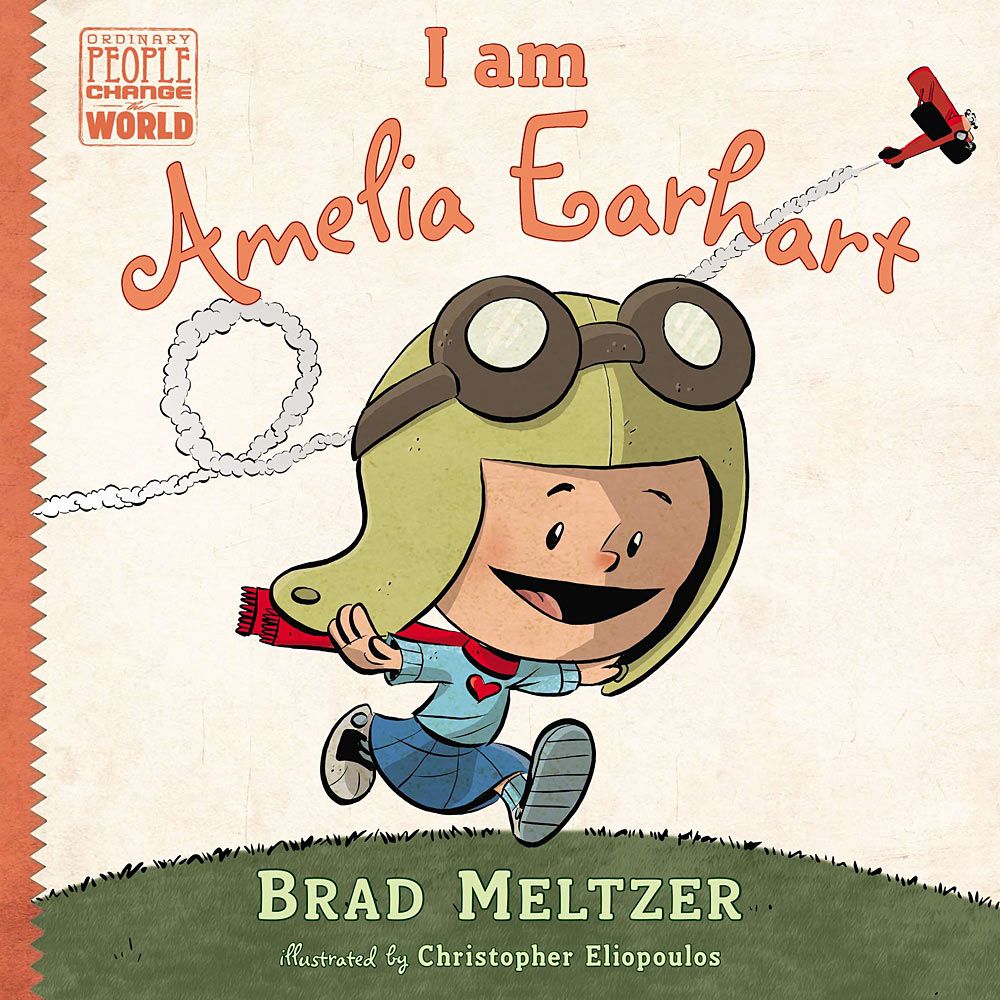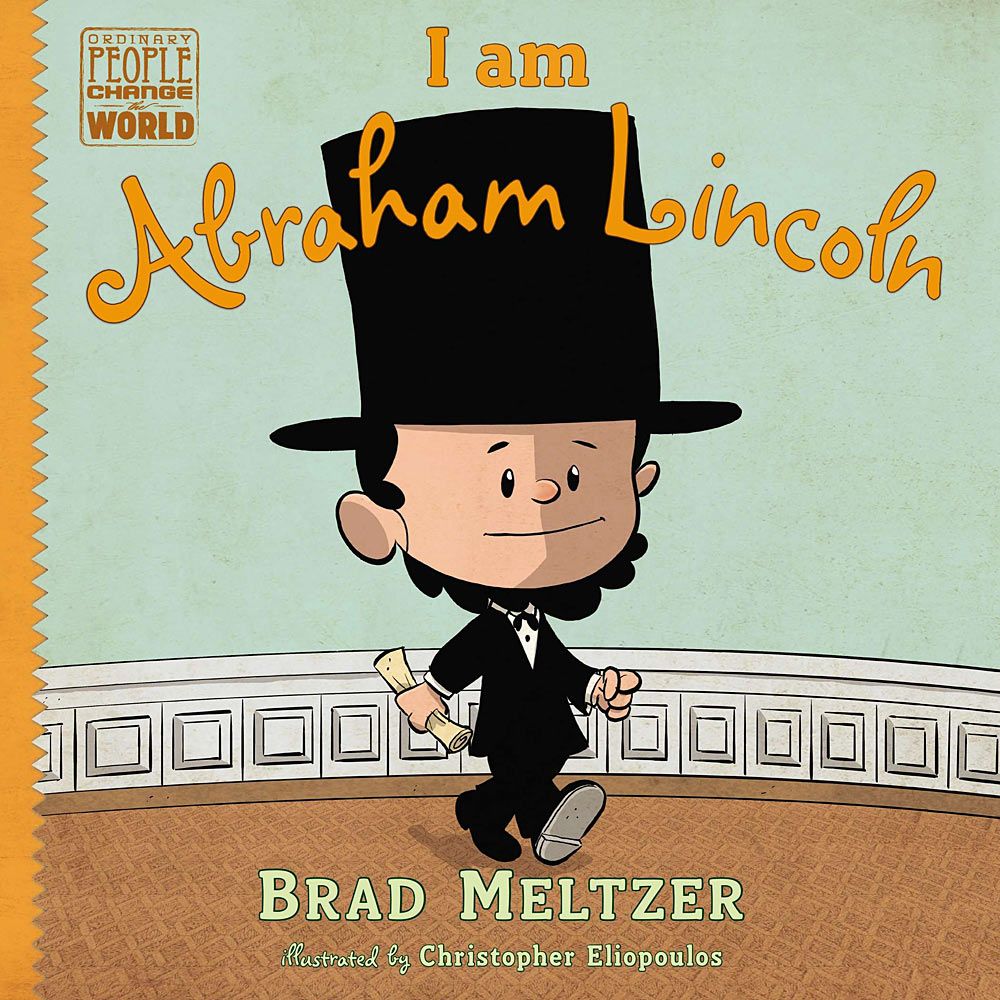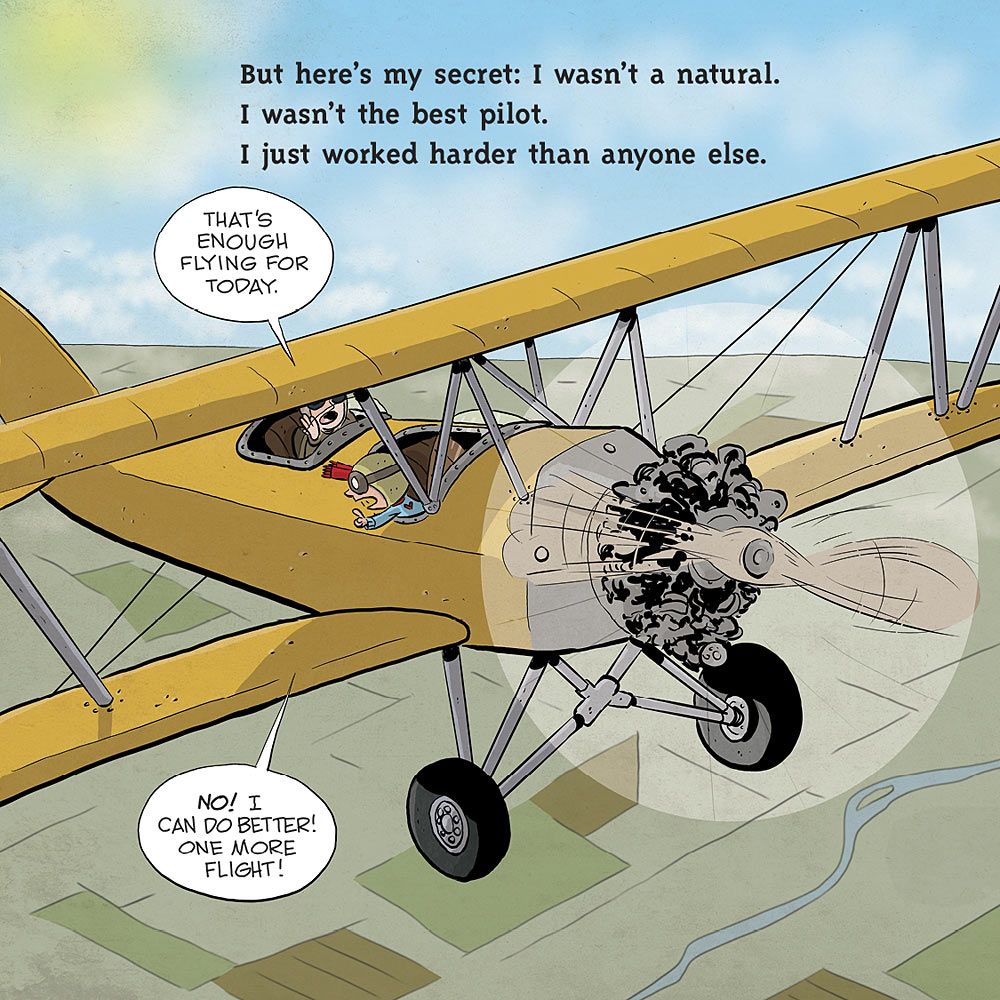Brad Meltzer has made a career of writing bestselling novels and comic books featuring characters who possess heroic and even super-heroic qualities, but in his new series of children books he explores true heroes including one of the all-time greatest U.S. presidents and the first female aviator to fly solo across the Atlantic Ocean -- ordinary people changing the world.
In "I am Abraham Lincoln" and "I am Amelia Earhart," both beautifully illustrated by Chris Eliopoulos, Meltzer retells the lives of these American icons with the exhaustive research that made his television series "Decoded" so popular but with the broad stokes of a child's imagination, making each one not only a history lesson, but a morality tale and a super fun picture book.
With plans to release "I am Rosa Parks" by mid-2014 and "I am Albert Einstein" by the end of the year, Meltzer told CBR News that one of his goals with the series, published by Penguin Group, is to help parents build a library for their children with books about real heroes, not "the reality TV show stars and loud-mouthed athletes" the tabloids and talk shows build up (and often destroy) as part of the 24-hours news cycle.
Meltzer, who was the first writer to sit atop "The New York Times" Bestseller List and the Diamond Comic Distributors Top 100 Sales Chart simultaneously when "Book of Fate" and "Justice League of America" launched in 2006, teased that "I am Abraham Lincoln" and "I am Amelia Earhart" are filled with Easter eggs, magic numbers and hidden codes for parents and adult readers alike. The writer also revealed that while he was drawn more to Abraham Lincoln as a child, he sees the importance of young girls and young boys reading about female heroes like Amelia Earhart and Rosa Parks.
CBR News: The first time I interviewed you, back in 2006, you were launching a brand new "Justice League of America" series for DC Comics. But over the years with projects like "Heroes for My Son" and "Heroes for My Daughter," you've transitioned to telling stories about another kind of a hero: ordinary people changing the world. Why is it equally important to tell these kinds of stories versus super-heroic ones?
Brad Meltzer: It's our history. It's as simple as that. How we define the word "hero" today is broken. We look at it all wrong. We've turned reality TV show stars and loud-mouthed athletes into heroes. And that's not a hero. That's fame. Fame is very different than being a hero.
I'm just being as honest as I can because I've known you a long time and you've seen the whole progression but I've watched both of my parents die. And I don't think you should respect anything I say because I have dead parents but what that did for me was made me make the inevitable look at my own life. Oddly, it also makes you less afraid because you've taken the really hard punches so all of the petty things in terms of what people thought about you when you say something, really does, if you let it, fade. At that point and time, when it was my mom passing and then my dad, I said to myself: "Whatever I am as a writer, I want to be more honest with my reader." I started letting my own personal life and beliefs hang out more.
Meltzer Shares "Heroes for My Son"
You mentioned hard punches, and while Amelia Earhart didn't take physical punches as a young woman she definitely dealt with some crushing blows to her ego about what she could and couldn't do because of her sex. However, Abraham Lincoln, as you show in "I am Abraham Lincoln," did take some real punches as a kid. Was it those kinds of stories that initially fueled this project?
When I started the books, I wanted my daughter to see better heroes. It was bothering me that all she was seeing was these reality TV stars and stupid athletes and I thought there are just so many better heroes for her. The truth is we were going to do a fun, little book with the history of Amelia Earhart and Abraham Lincoln. And the odd thing that happened was that as I started my research, I was looking at their childhoods. As I was telling the stories to my own daughters, that's where they started to react. They reacted to the moments when they were kids. You can ask Chris Eliopoulos but that's where the book changed and took off.
What we submitted was a nice, little, cute book and when the art came in, my agent said, "The art is so beautiful on this book, you have to lift your writing to match the art. You can't just do the history lesson." And I said, "You're absolutely right." Chris has become an absolutely different artist on these books. I went back and started looking at their lives completely and when I found these stories of Amelia Earhart at seven years-old and Abraham Lincoln when he's 10 years-old, you can see not only their future success but also you see everything we love about them. It's all right there.
If I tell my daughter that Amelia Earhart flew across the Atlantic in a plane, my daughter and just about any other daughter living today would say, "Big deal. So does everyone else." But when you tell the story about when they were seven years-old then Amelia Earhart isn't some black and white figure in a newspaper. She's just like your child. Suddenly, she's alive and suddenly, she's a real person. That's the real goal of the book to turn these people from these lower case 'g' gods to ordinary people.
You've mentioned reality TV stars and loud-mouthed athletes a few times. What about superheroes? There is still room for superheroes, right?
There'd better be. Those are the first, great morality lessons we all read when we're younger. Everyone likes to say that the first great book that taught them morality is "The Bible" or something else they are "supposed to say." But to me, the first great morality tales that we read as kids are superhero comics. You can see in my own writing that my fascination is not that the superhero punches the bad guy in the face. My fascination is the person behind that hero. My fascination is what they sacrifice to do what they do. And that's why the hero story is vital. It's not just does it have a place? It must have a place because if it's not, we have nothing to aspire to.
When you were considering which heroes to explore first in this series, were Abraham Lincoln and Amelia Earhart your only choices as the first two out of the gate or did you consider other options?
The first three were obvious. We went to the publisher and the Amelia Earhart book was done. I did it for my daughter because she just loves Amelia Earhart. There was a focus group of one: my daughter. I think Abraham Lincoln wins the popularity contest handily. And the beautiful thing is that he is one of the true heroes that we can all agree upon. And the same goes for Rosa Parks, who we are doing next. Those are pretty obvious and then there are other ones that come very, very quickly to me so after that, we had to find a mix.
We found some old, now let's find some new. We're going to do Albert Einstein after that because we didn't want everything to be about the Revolutionary War or the Civil War. We wanted to do something a hair more modern. That's where we started. And we started with the ones that were most obvious to us. If you go about it and say, "What will everyone else like?" You're eventually going to fall flat. What you have to do is say, "These are the ones that I have the most passion for and they will make the best books." And that's what you have to do always.
And the great thing for you is that heroes come in all different shapes and sizes.
That's what we are very conscious about. The word "hero" is this big giant bubble that you can put over everything but eventually you have to narrow it down. These are morality tales and we wanted each one to be different. Amelia Earhart is daring to do what no one has ever done before. She knows no bounds. She will try anything and prove anyone wrong, especially when they tell her she can't do it. Abraham Lincoln always stands up for others. Rosa Parks doesn't back down and will always stand up for herself, which is just as vital a lesson -- standing up for yourself. And Albert Einstein proves the importance of asking why? and the importance of curiosity. If we do our job right, we will hopefully have lessons for all of our kids to live by. I can tell my kids all of these lessons but we all know that the power of a story is that you get to show it to them.
If I've learned anything over the years, it's that readers decide what books are -- not authors. What I've seen in my house, this is the only book -- and that includes "Heroes for My Son" and "Heroes for My Daughter" -- that my kids reacted to that I've worked on. In an odd way, they can't be impressed by anything their dad does.
But I read these with my five-year old and we read it together -- same thing with my eight-year old. The interesting thing is that my 12 year-old reads them on his own. He just sees something in it. My oldest is a reluctant reader. He does read "Diary of a Wimpy Kid" and loves it but finds it very hard to find other things that he can relate to. And he said to me, "Can you show us the Albert Einstein book?" And that was even before the art was coming in. He was just so fascinated as I was telling him the stories and I literally said to my wife, "Who took our child and replaced him?" He was just fascinated with Albert Einstein as a historical figure. Obviously that was always a goal when we started doing these books but it does seem like somewhat a miracle when you achieve it.
You've said that you make a conscious effort to put your personal life into all of your books. Were you more Amelia Earhart or more Abraham Lincoln as a kid?
That's a good question. In my head, I wanted to be more Abraham Lincoln. Abraham Lincoln -- and I say this with all due respect to Amelia Earhart and Rosa Parks and everyone else -- is the one hero that truly, truly lives up to the hype in every level of his life. I can't tell how many Abraham Lincoln stories didn't make it in. I could write another Abraham Lincoln book. [Laughs] Even as a child, there is a story of him seeing a bird and he literally stops and picks it up to put it back in the nest. And the guys that he's with are these ridiculously, cliched rough and tumble guys and they're laughing at him. And he was like, "If I don't pick up this bird, I won't be able to sleep tonight." You have to have some devil in your soul and he doesn't. Over and over and over again, he sticks up for the underdog, fights for those that need help -- over and over and over again. If you're asking me, that's what I always aspire to. I just don't think that I was ever as brave as he was. But I wanted to be.
My 10 year-old son loved the Amelia Earhart book and my daughter really enjoyed the Abraham Lincoln one. Is it important for boys to read about girls doing extraordinary things and vice versa?
I can only speak for myself, but truthfully I think my boy is bombarded every day with how great boys are. They're the heroes in every book. Cartoons must have a male protagonist because boys and girls will watch a boy but only girls will watch a girl. And I can tell you how vital it was for my boy to read and enjoy "The Hunger Games" with a female protagonist.
Again, this is my personal bias but I think it's vital for my son to read about Amelia Earhart. And I think it's vital for my daughter to read about Abraham Lincoln. The moment we put gender on this and say, "You can only be like yourself," you're painting the world with only half the colors.
You mentioned the importance of Chris Eliopoulos, your artist, earlier but how did you two come together for this project?
The truth is that Chris and I met over Twitter of all things. As we were doing "Decoded," he revealed that he loved history and we just started talking back and forth. I was a fan of his work. I love his cartoons and when I wanted to do a design of Amelia Earhart for my daughter, he was who he went to. Again, the real secret ingredient, the special sauce to all of this is Chris. What I love about his work is that it has that "Peanuts"/"Calvin and Hobbes" quality that can only be labeled as heart. It's easy to draw historical figures and something cute but it really is hard to draw something with heart. And that's what gives the books the emotional resonance that we wanted them to have. I can't stress enough that the books changed entirely when he came in. I needed to literally start re-writing them from scratch because his art was so good.
Am I right in saying that I saw the Meltzer family in both books? How important to keeping parents engaged in children's books are those types of Easter eggs because you told me, offline, that Clark Kent is hidden in every book too?
From "Bugs Bunny" to "The Simpsons," if you're just writing for the kids, you're doing a disservice to the parents. There are jokes in there for all of us that are adults and all of us that had to sit through awful books that are kids made us read. We filled these with jokes, Easter eggs, magic numbers and tons of hidden codes. Honestly, in some books, you'd be hard pressed to find them all because we hid so much in them.
Meltzer Remakes History in "Detective Comics" #27
Just last week you made your return to comics in "Detective Comics" #27 with a short story illustrated by Bryan Hitch. Any plans for a longer run on a comic book series?
That was my first true Batman story. It was one of those things that you were just honored to be asked. They asked me if I wanted to retell the very first Batman story with Bryan Hitch. Who says no to that? I took all the profits from the book and bought Hitch's art. It was so well done.
As for anything long-term, I know it sounds silly but now that I am writing these books, they're comic books to me. These are my new comic books. That's what they are. That's why I picked a comic book artist to do them. And I write them on the same script format that I write all of my comic books. I know they are supposed to be labeled as a certain thing for booksellers but they're comics.
And you'll see it especially with Albert Einstein. We do some great panel stuff where I was like, "You know what, this is the only way to tell this in a sequential art way. Let's just do full-on panels."
And is there a plan to do two a year?
We started with Abraham Lincoln and Amelia Earhart. Six months from now is Rosa Parks and six months after that is Albert Einstein. And yes, the goal is to do two a year. The goal is to help people build a library for their kids.
"I am Amelia Earhart" and "I am Abraham Lincoln" are on sale now.




